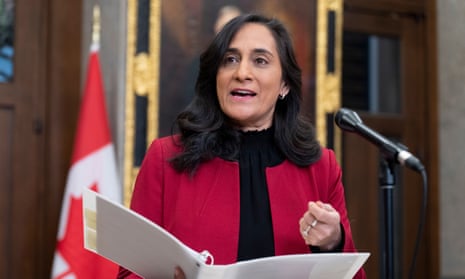Canada’s defence minister has said the country is “highly interested” working closer on defence technology with Australia, Britain and the US, after reports that the country wants to join the Aukus defence pact.
The Globe and Mail reported on Monday that Canada was making efforts to join the group, amid fears that the country could be excluded from valuable intelligence and technology sharing between a smaller circle of nations. Both the foreign affairs ministry and Privy Council are working to have Canada included, the Globe reported.
Asked whether Canada had made a formal application to join the deal, defence minister, Anita Anand, told reporters: “Canada is highly interested in furthering cooperation on AI, quantum computing and other advanced technologies with a defence nexus with our closest allies.”
Anand said: “Our ties with our Five Eyes allies are strong, and indeed we remain interested in furthering cooperation in AI and other innovation efforts with our allies.”
The Aukus agreement was seen as an effort by the three signatory nations to build up a greater presence in the Indo-Pacific region, and included an agreement to supply nuclear-powered submarines to Australia.
At the time, officials in Ottawa downplayed the deal’s relevance to Canada.
“This is a deal for nuclear submarines, which Canada is not currently or any time soon in the market for. Australia is,” Justin Trudeau told reporters at the time.
But Canada’s exclusion from the alliance was seen as something of a snub for the country, and the prime minister faced sharp domestic criticism over Canada’s exclusion, with his Conservative rival suggesting the prime minister was “not taken seriously by our friends and allies around the world”.
Canada has since announced its own Indo-Pacific strategy, to “promote and defend” its national interests in a region where nations are jockeying for influence and power.
Thomas Juneau, an associate professor in the Graduate School of Public and International Affairs at the University of Ottawa, said: “There was a lot of hand wringing in Canada at the time, as there always is when we’re not part of something. But Canada does not want nuclear submarines. We don’t have the money for nuclear submarines at this point.”
Canada already shares intelligence with Australia, the United Kingdom, the United States and New Zealand – an agreement known as the Five Eyes.
But in the months since Aukus was formed, a number of working groups have formed to deal with emerging and disruptive technologies, said Juneau, who is working on a paper about the future of Canada’s relations with Aukus with Stephanie Carvin, an associate professor of international relations at Carleton University.
Juneau said it was “definitely in Canada’s interest” to try to be in those working groups, though it is unclear how closely they will be tied to the nuclear submarine technology dimension.
“The door is not shut for Canada to be involved, but Canada will have to show what it can bring to the table,” he said, adding Canada has emerged as a leader in artificial and signals intelligence.
But amid growing criticism that the governing Liberals have neglected defence and intelligence investments, Canada faces stiff competition to gain access to the group as other nations, such as Japan and South Korea, also make a case for inclusion.
“We’re not going to be brought into these groups, just because we’re a traditional ally,” said Juneau. “We’re going to be brought into these groups, because we can make the case that we have something to contribute, which in some cases, is a case that we can make.”
